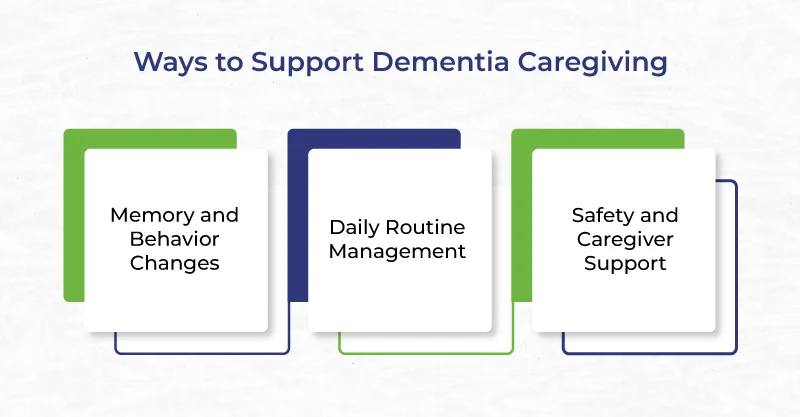Understanding Alzheimer’s and Dementia Care
Our parents and loved ones spend a lifetime caring for us, but when Alzheimer’s or dementia sets in, the roles begin to reverse. Alzheimer’s is a progressive brain disorder that affects memory, behavior, and the ability to perform daily tasks.
It is one of the leading causes of disability among seniors and creates emotional, physical, and financial challenges for family caregivers. Understanding the condition and preparing for caregiving is the first step toward ensuring safety, dignity, and comfort for your loved one.
Key Challenges Families Face While Caring for Alzheimer’s Patients
Emotional Stress and Grief
Family members often feel overwhelmed by their loved one’s memory loss, personality changes, and confusion. This can lead to stress, sadness, and even caregiver guilt.
Daily Routine and Independence Issues
Simple tasks like bathing, eating, and dressing can become difficult for individuals with Alzheimer’s, requiring continuous support.
Communication Barriers
Alzheimer’s affects speech and understanding, making conversations frustrating for both patients and caregivers.
Behavioral and Emotional Changes
Mood swings, agitation, and aggression are common and can be challenging to manage without proper strategies.
Safety Concerns at Home
Risks of falling, wandering, or misusing household items make safety one of the biggest concerns for families.
Caregiver Burnout
Family caregivers often sacrifice their own health, career, and social life, leading to exhaustion and stress.
Financial Strain
Long-term Alzheimer’s care can become expensive, especially when medical support and assisted living facilities are required.
You may like to read this: Dementia – A Guide for Families
Practical Tips for Families Caring for Loved Ones with Alzheimer’s
1. Establish a Routine
Set a daily schedule for meals, medications, and activities. Familiar routines reduce confusion and bring a sense of comfort.
2. Encourage Independence
Allow your loved one to do as much as they can on their own. Gentle assistance helps maintain dignity and confidence.
3. Improve Communication
Use simple words, maintain eye contact, and rely on non-verbal cues like gestures and touch to reassure them.
4. Create a Safe Environment
- Install grab bars in bathrooms
- Use non-skid flooring
- Add night lamps in hallways
- Keep rooms clutter-free
5. Introduce Engaging Activities
Games like puzzles, crosswords, music therapy, or light exercises stimulate memory and improve mood.
6. Take Care of Yourself as a Caregiver
Join support groups, share responsibilities with family members, and consider professional respite care when needed.
7. Explore Professional Alzheimer’s Care
If the challenges become overwhelming, specialized facilities can provide trained staff, safe infrastructure, and 24/7 monitoring.
PapayaCare – Specialized Alzheimer’s & Dementia Care in India
At PapayaCare Assisted Living Facility in Ahmedabad, we understand the struggles families face while caring for loved ones with dementia. Our approach combines compassion with professional care to ensure safety, comfort, and engagement for residents.
Why Families Choose PapayaCare:
- Trained caregivers who specialize in dementia and Alzheimer’s support
- 24/7 nursing staff for medical monitoring, medication management, and hospital visits
- Safe and secure environment with non-skid flooring, support bars, and constant supervision
- Engaging activity schedules including yoga, music, memory games, and hobbies
- Home-like comfort with freshly prepared meals, hygiene-focused care, and warm companionship
Families can feel confident knowing their loved one is cared for in a nurturing, secure environment that feels like home.
FAQs on Caring for Loved Ones with Alzheimer’s
What are the biggest challenges of caring for someone with Alzheimer’s?
The most common challenges include memory loss, behavioral changes, communication difficulties, safety concerns, and caregiver burnout.
How do you calm an Alzheimer’s patient?
Stay calm, speak gently, and redirect their attention with music, puzzles, or familiar activities. A structured routine also helps reduce anxiety.
How can family caregivers reduce stress?
Take regular breaks, join caregiver support groups, and explore respite care or assisted living services to maintain balance.
When should you consider assisted living for Alzheimer’s care?
When your loved one’s safety is at risk, medical needs increase, or caregiving becomes overwhelming, assisted living may be the best option.
Is Alzheimer’s care available in India?
Yes. Facilities like PapayaCare in Ahmedabad provide specialized dementia and Alzheimer’s care with trained staff, medical monitoring, and safe infrastructure.
Conclusion
Caring for a loved one with Alzheimer’s is both rewarding and challenging. It requires patience, compassion, and the right support system. Whether you choose home care or an assisted living facility, the goal is to ensure dignity, safety, and quality of life for your loved one.
👉 Looking for Alzheimer’s and dementia care in India? PapayaCare is here to support families every step of the way.

















